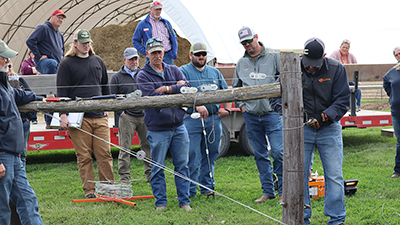Hands-on opportunities connect learning with real life at fencing and grazing clinic
5/25/23
Fencing and grazing clinic attendees practiced tying a proper knot around
an H-post under the watchful eye of Gallagher Animal Management staff.
LEWIS, Iowa — Understanding and implementing appropriate fencing and grazing practices can pay big dividends for cattle producers. Iowa State University Extension and Outreach beef specialist Erika Lundy-Woolfolk said the 2023 Fencing and Grazing Clinic hosted by ISU's Iowa Beef Center focused on efficient and effective tools and techniques. The daylong program was held at the ISU Armstrong Research Farm near Lewis in southwest Iowa.
Lundy-Woolfolk, who also was one of the program organizers, said timing of the event should help participants start using the information as soon as this grazing season.
"We’ve heard a lot of interest from cattlemen and livestock producers looking for educational opportunities to help them enhance their pasture and forage management skills and take it to the next level," she said. "This clinic was designed with them in mind."
IBC extension program specialist Beth Reynolds also helped plan the event.
“One goal for this clinic was to expose participants to tools and concepts they can use to help meet their grazing goals,” she said. “Attendees always enjoy hands-on opportunities, and the advancements in the technology and fencing worlds have really changed in the last few years and made it easier to implement rotational grazing.”
The morning session featured new options in fencing, such as smart fencing and electronic wiring systems for electric fences, presented by a Gallagher Animal Management representative. Effective fencing systems go hand-in-hand with adequate grazing practices. Participants learned how temporary and permanent fencing tools can make grazing different paddocks easier when moving cattle and could practice some electric fence wiring.
Kayla Creek with Natural Resources Conservation Service shared info on the importance of developing and using effective grazing systems. She also led an activity in which attendees were able to practice designing paddocks using pasture maps.
“Livestock farmers are also grass farmers, and that is why it is so important to implement effective grazing systems,” Creek said. “The benefits of rotational grazing and efficient paddock systems provide a better graze and better fertilization.”
During the classroom session, ISU extension field agronomist Aaron Saeugling shared information on toxic plants in Midwest pastures and forages, and reminded attendees that a variety of toxic species can be found throughout Iowa. This spurred questions and discussion on identifying invasive species.
IBC research scientist Garland Dahlke provided an overview of water quality criteria, testing and interpreting results, and health concerns related to cattle that consume compromised water. He reminded participants that all cattle interactions with water need to be balanced in a diet plan, and explained how to take a water sample and where to send those samples.
Lundy-Woolfolk and Reynolds talked about planning a grazing calendar, including the importance of being aware of seasonal changes associated with pasture growth and forage availability. Their session also covered estimating number of days available for grazing, calculating grazing days and rest times, measuring forage yields, and considering aspects of cattle intake.
More than 60 attendees from Missouri, Kansas and 19 counties in Iowa attended the May 16 clinic, which was provided by sponsors Gallagher, Iowa Forage and Grassland Council, Theisen’s, Millborn Seeds, Iowa State Beef Checkoff Program, Practical Farmers of Iowa and Dairyland Laboratories Inc.
(This article was written by IBC communications intern Makenzie Hereth.)
-30-
The Iowa Beef Center at Iowa State University was established in 1996 with the goal of supporting the growth and vitality of the state’s beef cattle industry. It comprises faculty and staff from Iowa State University Extension and Outreach, College of Agriculture and Life Sciences and College of Veterinary Medicine, and works to develop and deliver the latest research-based information regarding the beef cattle industry. For more information about IBC, visit www.iowabeefcenter.org.
Contacts:
Erika Lundy-Woolfolk, ISU Extension and Outreach beef specialist, 641-743-8412, ellundy@iastate.edu
Beth Reynolds, ISU Extension and Outreach education specialist, 515-294-9881, bethr@iastate.edu

